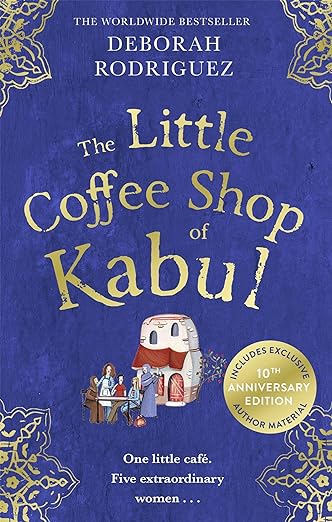
Last week, my book club friends and I got together to talk about the book, The Little Coffee Shop in Kabul. The book was written in 2011 and was definitely a book of its time. Written during the Talibans takeover in Afghanistan, it offers an interesting insight into the ex-pats who called Kabul home.
There were five of us at our book club meeting. We’re all mums and two of us are expats living in Ireland, originating from another country. The five of us always have lively discussions around more than just the book we’re reading and this months get together was no different. Our discussion steered away from the book writing itself and focused more on the characters. There are a lot of characters. I had to go back several times to remind myself who was who. I prefer to read stories with less characters and dive more deeply into the relationships between fewer characters, which to me, was missing in this book.
The one theme that we all could relate to was the impact of culture on identity. I’m fascinated by this topic especially as I’ve lived in five countries and have battled my own inner conflicts around what one “should” do in situations or is “expected” to do. When I moved to Australia I expected it to be similar to the USA as they’re both English speaking countries. I learned very quickly that Australian culture is quite different becoming aware of how I talked, thought and acted. Sydney culture is different to Melbourne culture to Perth culture. And actually if you think about it, the culture you were brought up in will be based more on just location alone. It’ll include your socio-economic status, your parents influence, and your belief system among other constructs.
When reading The Little Coffee Shop, I seemed to have a subtle understanding of the main characters motivations in the book because the main character is an expat American, as am I. The author is also American, so the writing and the continuity of the story didn’t impact my reading. But I could understand why one of our book club members said the book felt American.
Our expectations are the result of beliefs, associations and expectations taught to us when we’re children. They are forced on us, whether we like it or not. But they aren’t what make us who we are. We have the opportunity to change our thinking, more importantly how we perceive the world, when we’re introduced to school and other social communities. That’s why I believe travel is so important. To expose yourself to others beliefs, cultural traditions, stories, language, and humor. Challenging yourself and who you think you are is difficult, which is why many don’t move or travel. Yet, no matter how many countries I’ve lived in, no matter how many cultures I’ve visited and learn more about, my USA cultural identity is right there with me.
What are your thoughts about culture’s influence on who you are as a person? I’d love to hear your stories as I consider writing more on this topic. Feel free to email me at beth @ bethelee.com.

No responses yet